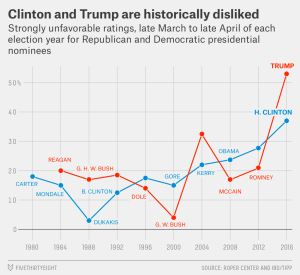
FiveThirtyEight website uses the graph from research. See the full story.
Remember 2008? That year, a young Democrat was elected president after galvanizing voters around the positive ideas of “hope” and “change.” Negativity will be the main factor driving American voters to the polls this November.
According to the analysis from website FiveThirtyEight, both Hillary Clinton and Donald Trump have the two lowest favorability ratings of presidential nominees in the past ten election cycles.
According to a new study from Pew Research Center, more Americans are planning to vote against a candidate rather than for a candidate. However, dissatisfaction is not limited to national races.
North Carolina Gov. Pat McCrory has had an incredible 34 month streak of unfavorable ratings, according to Raleigh-based Public Policy Polling. Donald Trump is pulling down the polling numbers of many down-ballot Republican candidates all across the country, but McCrory is one of the exceptions. His polling numbers remain lower than Donald Trump’s.
Todd Collins, Director of Public Policy Institute at Western Carolina University, said that actions the candidates have made are reinforcing negative public perception of themselves. Collins cited the the Duke Energy coal ash spill scandal in North Carolina for McCrory and Hillary Clinton’s failure to disclose her recent bout with pneumonia to the public.
“It’s not just this one thing,” explained Collins. “It’s this larger narrative that goes on. For McCrory, the coal ash stuff goes into the narrative of ‘he’s in the pocket of Duke Energy.’ For Hillary Clinton, it’s not that she may or may not have pneumonia… it goes with this narrative of ‘she’s very secretive… she hides this stuff from us.’”
Voters in Western North Carolina shared the same sentiment of the unpopularity of the presidential candidates and the negativity of this election cycle as a whole.
“It’s a joke… and I’m still waiting for the punchline,” said Cashiers resident Craig Wilson.
Wilson first voted in the presidential election of 2000. He said the way the internet has changed news coverage has contributed to the current climate.
“There’s too much constant information out there about the candidates,” said Wilson. “It’s like we’re all sick of hearing about them and ready to move on. It’s not like it was before this era of constant news and opinions all over the internet.”
A 2014 study at Gwynedd-Mercy University backs up Wilson’s sentiment. The study found that the modern existence of the internet increases civic engagement with constant access to information. However, the study also found that online news readers were more apt to dissent with others over civic topics than print readers.
Kelsie Woodford, a graduate assistant at WCU, echoed the narrative of the election’s existence as a bad joke.
“I think it’s been hard because when Donald Trump first started running, people saw it as a joke,” said Woodford. “I think it’s become less and less funny.”
Despite the negative attitudes and references to the current election cycle as one awful joke, Western North Carolina residents remain determined to vote this fall. Chuck Boswold, a business owner from Cashiers, said that voting is part of his civic duty.
“It’s an honor to be able to vote… it’s part of the democratic process,” said Boswold.
Justin Brown, a criminal justice major at WCU, will vote for the first time this fall. He supports Gary Johnson, the Libertarian presidential candidate.
“I’m pulling hard for a third party this election,” said Brown. “Voting is my right as a citizen, and I want to practice it for the first time. You can’t complain if you don’t vote.”
The overwhelmingly negative attitudes surrounding this election cycle have made the old cliché “choose between the lesser of two evils” seem more commonplace than ever. This is also known as strategic voting – when one votes for the candidate one hates the least so that the candidate one hates the most will have the lowest chance of being elected.
“I think the crazy cycle will mobilize people to vote,” said Brevard resident Janie Stevens. “People hate the candidates this year… but they have to hate one more than another.”
Ultimately, voter turnout will determine election winner this fall. Eight years after rallying around hope, it seems hate will sway the heart of American voters come November.



